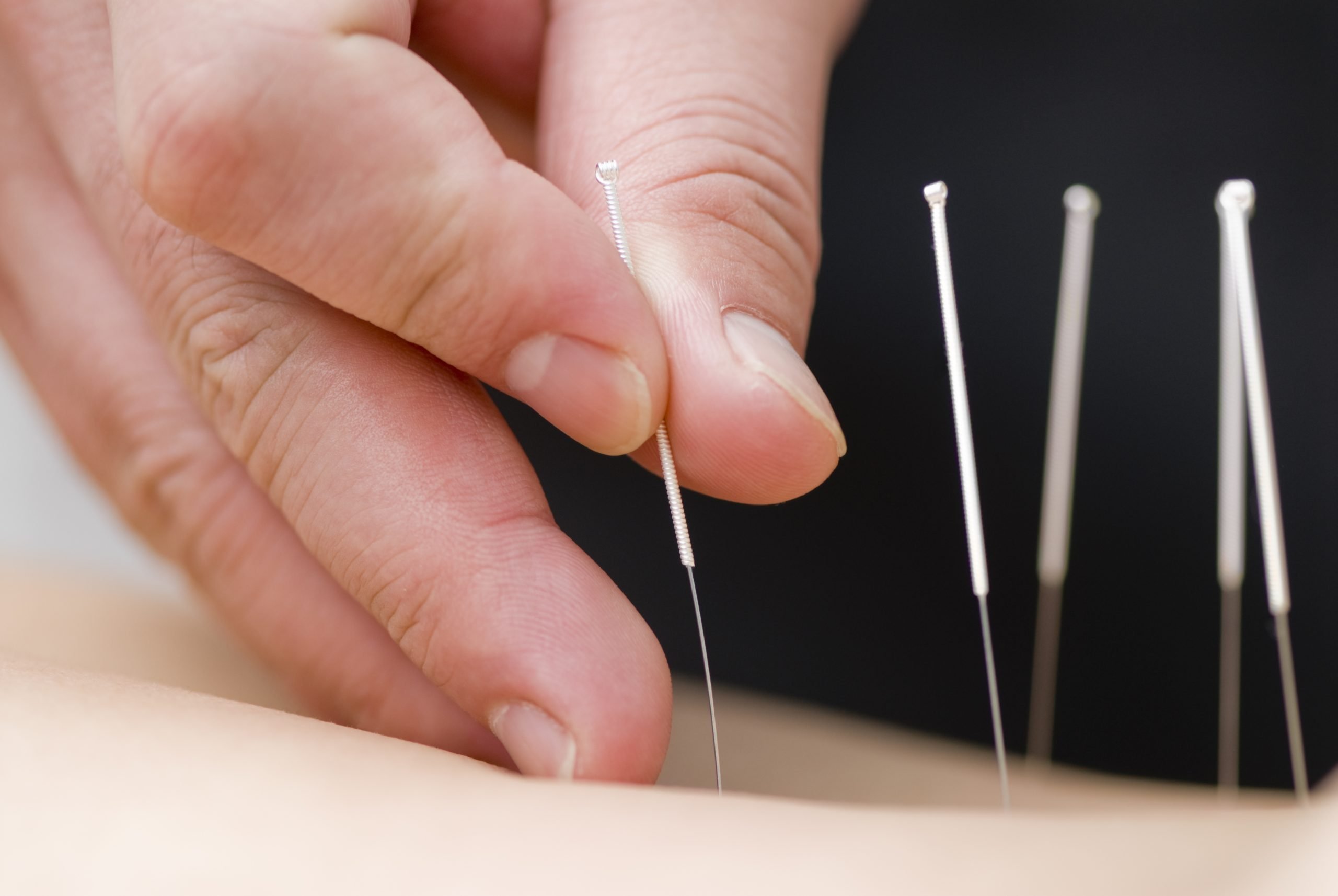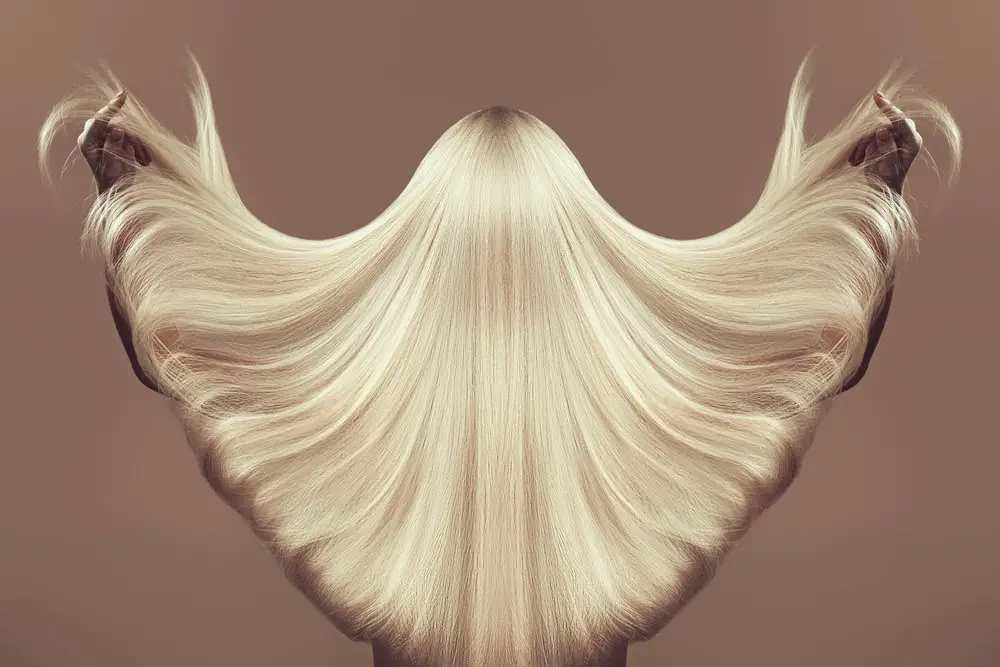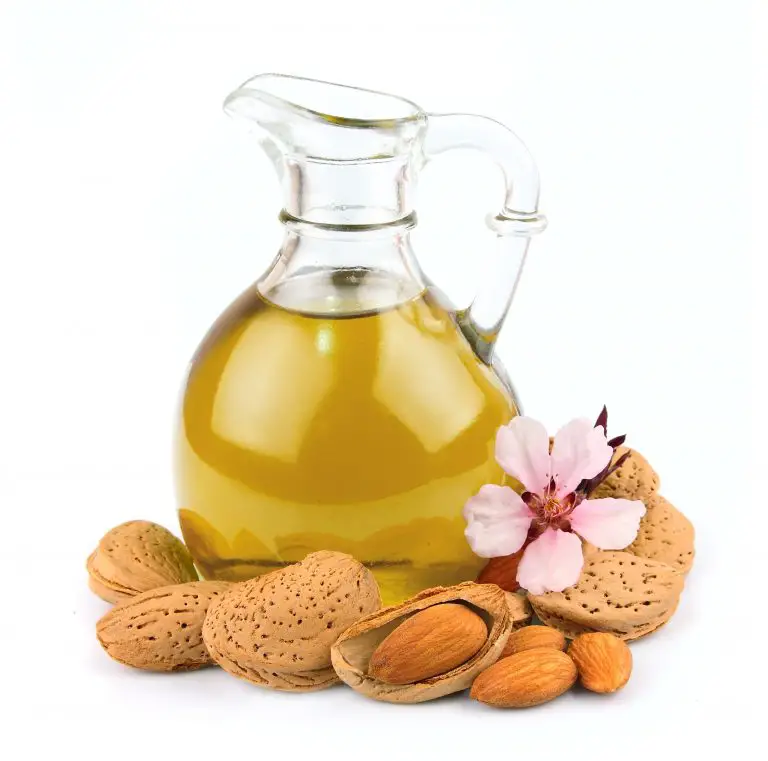
Page Contents
While you have likely eaten almonds at least once, you may not know about almond oil and how good it is for you. Almond oil has many benefits for your hair, as well as for the rest of your body. This oil has many other uses as well if you happen to have it on hand.
What Is Almond Oil?
In order to get almond oil, you first have to start with the almond tree. This flowering tree has a mixed origin, primarily originating from the Middle East and the Northern part of Africa. These flowers can often cover the tree in white or pale pink, the pollinated flowers forming the kernels.
These are not fully matured until seven to eight months after the flowers have fallen. Then, the nuts are shaken from the trees either by hand or manually. From there, the almonds are taken to a processing facility where the husks are removed from them.
Husking does not remove the almond shell, however, which is the next step. Sometimes the shelling is done in the same place, but sometimes the almonds are shelled in a different facility. All of this begins sometime in August and lasts for a few months since the almonds must dry at times.
Only after the almonds are shelled and dried can they be used to make the almond oil. There are two methods for getting oil out of almonds. This is done at yet another facility where the almond oil is also bottled.
Once obtained, the final product is sold to be used in a variety of different industries. While some of it is sold as pure almond oil, only a very small portion of the oil ends this way. Most of the oil finds its way into everything from cosmetics to culinary foods and medicine all around the world.
Almonds, and the almond oil made from them, have been used for various purposes for hundreds of years. In history, it has primarily been used for its nourishing and strengthening benefits. However, today it has too many uses to name. Cooking, hair loss, and skincare are just a few options.
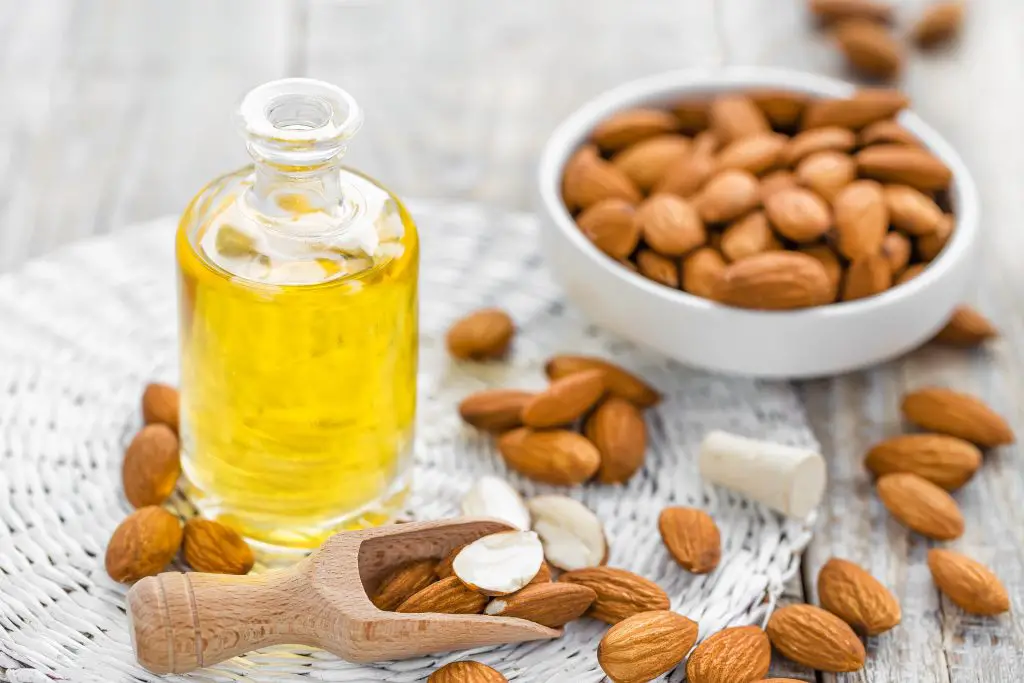
The Benefits Of Almond Oil
Almond oil has a large amount of a combination of monounsaturated, polyunsaturated, and saturated fatty acids. Specifically, there are both omega-9 (oleic) and omega-6 (linoleic) fatty acids. Both of these omega compounds are commonly considered beneficial to those who have various medical conditions.
These fatty acids are critical to your health since they are needed for your vital bodily functions. Omega-9, for example, is necessary for your heart’s health and can even assist those with Type-2 Diabetics.
Meanwhile, omega-6 is equally necessary to the regulation of your metabolism. This fatty acid also contributes to your reproductive health, which is something that you may very well value highly.
Almond oil also has noteworthy amounts of magnesium, flavonoids, and phenolic acids. The latter two actually make up a large percentage of almond oil. Both of these have very strong antioxidant properties. Antioxidants have a long list of things that they can do for you.
Specifically, antioxidants can help with the slowing down of oxidative stress. If left unchecked, oxidative stress is something that can lead to your body becoming imbalanced. This imbalance can result in age spots, wrinkles, gray hair, and other signs of aging.
This is on top of the well-known fact that antioxidants fight against free radicals in your body. Free radicals are atoms that can cause cancer, affect your immune system, and sometimes steal essential proteins from your cells.
Almond oil also has oleic acid and linoleic acid in it. These are lesser-known things that are also good for you. A few more common vitamins in almond oil are Vitamin D, Vitamin A, and some of the B vitamins. Vitamin E is also present, as are calcium and zinc. Though there are more, these are just the more common Vitamins in almond oil.
The Benefits For Your Hair

Any omega fatty acids can benefit your hair. However, omega-6 fatty acids are proven to particularly help stimulate hair growth. Both of these fatty acids can also help moisturize your hair to prevent it from becoming dry or brittle.
The magnesium, which will help protect your hair from falling out earlier than necessary, making it obviously beneficial as well. The flavonoids and phenolic acids are great for your hair for many reasons as well.
Since oxidative stress causes graying and can also cause your hair to thin, any help preventing this from happening will definitely help your hair growth. Free radicals, while bad for your body wherever they are, can be particularly bad for your hair.
The phenolic compounds in almond oil also have a few added benefits for your hair. This compound can also be used to treat scalp problems such as scalp ringworm. Not actually a type of worm, scalp ringworm is a type of fungal infection that affects the hair shaft.
It can affect all people, including children, and causes hair loss when untreated. Though antifungal compounds sometimes don’t work well, almond oil can be applied several times a day. This can not only treat the scalp ringworm, but it can also help any hair that is lost to grow back.
The oleic acid and linoleic acid found in almond oil make excellent DHT blockers. More specifically, these inhibit the production of the 5alpha-reductase enzyme that is responsible for converting testosterone to DHT.
Finally, as with anything that is good for your body, improving your health in any way will always help your hair. There is more to be said regarding how almond oil can benefit your hair, but those are just some of the more obvious advantages.
Related Reading
What To Look For In Almond Oil
There are a few things about almond oil that you should pay attention to when buying it. First, there is the important difference between sweet almond oil and bitter almond oil. When you think of the almonds that you buy from the store, those are sweet almonds.
The other almonds, called bitter almonds, are as bitter as their name implies. Apart from flavor, their uses are also different. Sweet almonds are eaten as a snack, put in salads or breads, and used in cooking. The bitter almonds are also used in cooking, but are more often used in flavorings and oils.
Though it is safe to eat, oil made from bitter almonds is not usually found in cosmetic or hair products. This is because bitter almonds have traces of glucose, cyanide, and one or two other things that can potentially irritate your skin. For this reason, if you are getting almond oil for your hair, you should definitely get the oil made from sweet almonds.
The second thing about almond oil that you must look at is how it is made. There are two terms regarding almond oil that you are likely to see here. These are expeller pressed and distillation extraction.
The expeller-pressed almond oil means that the oil is pressed out of the almonds. This pressing can be done with either cold or hot plates, and usually all the pressing is done at once. Meanwhile, the distillation extraction is done using some form of water or steam to break down all but the oil.
Distillation extraction is best if you want to get the most out of the almond oil. It leaves the most of the nutrients in the oil, and even offers one beneficial compound that is completely absent in the expeller pressed oils.
How To Use Almond Oil For Your Hair
There are basically two ways that almond oil can be used for your hair. The first is by consuming it, and the second is by applying it directly to your hair in some way. While both ways benefit your hair, applying it to your scalp is obviously the more direct method.
The two main ways to apply the almond oil to your hair is either by using it as a hot oil or by adding it to your shampoo. If you wish to, almond oil can even be used as an ingredient in a DIY shampoo that you make.
In a shampoo, using almond oil on your hair will take the least amount of time from your schedule. However, you usually don’t let shampoo sit in your hair for very long. This means that your scalp may not have time to fully absorb the benefits of the almond oil.
Therefore, using almond oil as a hot oil treatment, or in a hair mask, may be far better for you. You can heat the almond oil either before you place it on your hair or afterward. In the latter case, warm up a towel and put that over your oiled hair.
In the former case, you will need two containers, one small enough to fit inside the other. Placing the almond oil in the smaller container, put the hot water in the larger container to heat the oil. Once warm, the almond oil can be massaged into your scalp.
However, you shouldn’t completely discount taking almond oil orally. You may find it easy to substitute almond oil in the place of an oil you normally use. Or, you can try completely new recipes that specifically call for almond oil.
The Pros And Cons
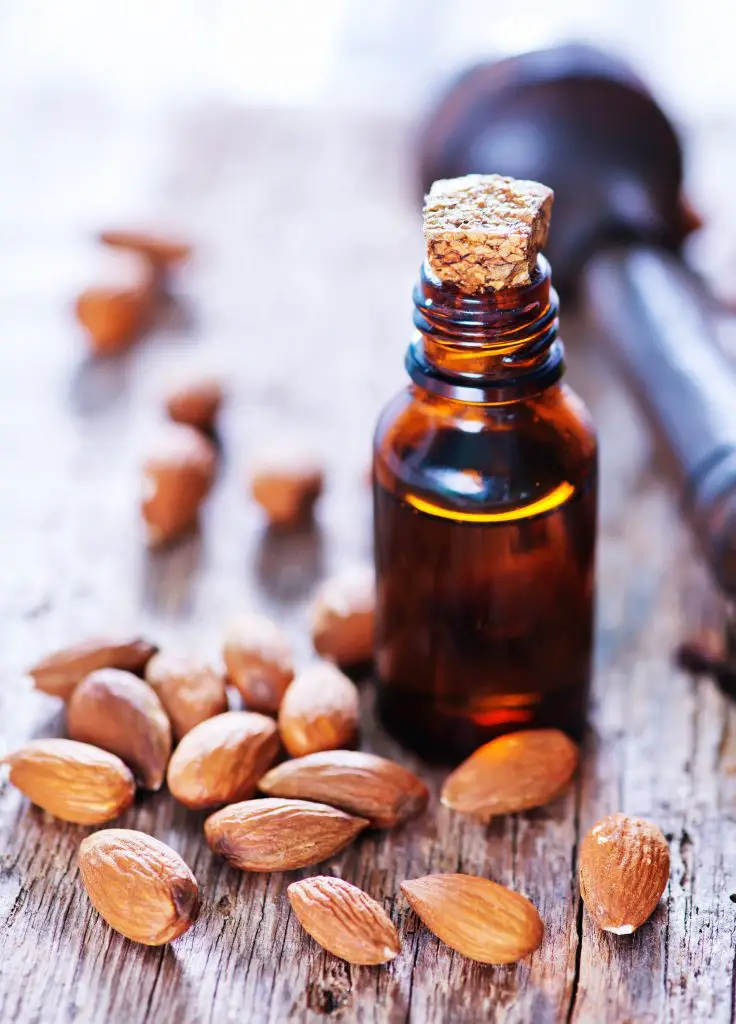
Almond oil is one of the few plant oils that has had studies done on it regarding its effects on your hair. True, there have not been nearly as many studies on it as on such things as saw palmetto. Still, a few studies are better than none whatsoever.
This is especially true since these show that almond oil is quite effective at helping hair grow. The limited research does show that the specific variety of nutrients found in almond oil can even help with various forms of alopecia. There is also some small evidence to suggest that it helps with other hair problems such as dandruff.
In one test study that was done on rats, almond oil extract was just as effective as minoxidil. Considering minoxidil is considered one of the best hair loss treatments you can get, this makes almond oil amazing. The compounds and vitamins in it are all excellent for your hair.
That said, almond oil should be used in moderation, just like anything else. Though rare, some of the compounds in almond oil can interfere with some prescription drugs if you are taking any. Side effects may be rare, but almond oil can cause them just as much as anything else.
Anyone with nut allergies, especially severe ones, should obviously never try to use almond oil. This would be dangerous to try to use on your hair or any way. Allergic reactions to almonds are nothing to take lightly and can even be fatal.
Finally, again to its advantage, almond oil has a very pleasant smell. In fact, sometimes almond oil is added to hair or cosmetic products solely because of its nice smell. Considering how unpleasant some hair growth products can smell, this is very nice indeed.
How To Make Almond Oil
While extremely troublesome, it is entirely possible to make your own almond oil at home. There are two methods of making almond oil yourself. One requires only a blender but a lot of patience, while the other requires an oil press.
First, you need unroasted almonds and a little bit of olive oil if you are going with the blender. Placing just the almonds in the blender, start it off on low speed at first. As the almond pieces become small, you will need to periodically stop the blender to scrape the buildup on the sides.
As you continue to do this, you can turn the blender up to medium, and then eventually up to high. Once the almonds are close to being smooth, you must add a little bit of olive oil to it. Do not add more than one teaspoon, just enough to get the almonds into a smooth paste.
Once smooth, take the almond paste and put it into a jar, preferably a glass one. Use your spatula to flatten the paste evenly in the jar. Leave the almond paste in the jar for about two weeks without disturbing it.
During that time, the almonds will separate, and the oil will rise to the top. Pour off this oil, and you have your almond oil. All nuts naturally separate like this, which is why nut butters add ingredients to keep them from separating.
Using an oil press is much simpler and faster since it requires no waiting time. Simply place the nuts into the top of the press and crank the handle. The press will do the rest of the work for you. All you must do to get your almond oil is to put a jar at the end to collect the oil.
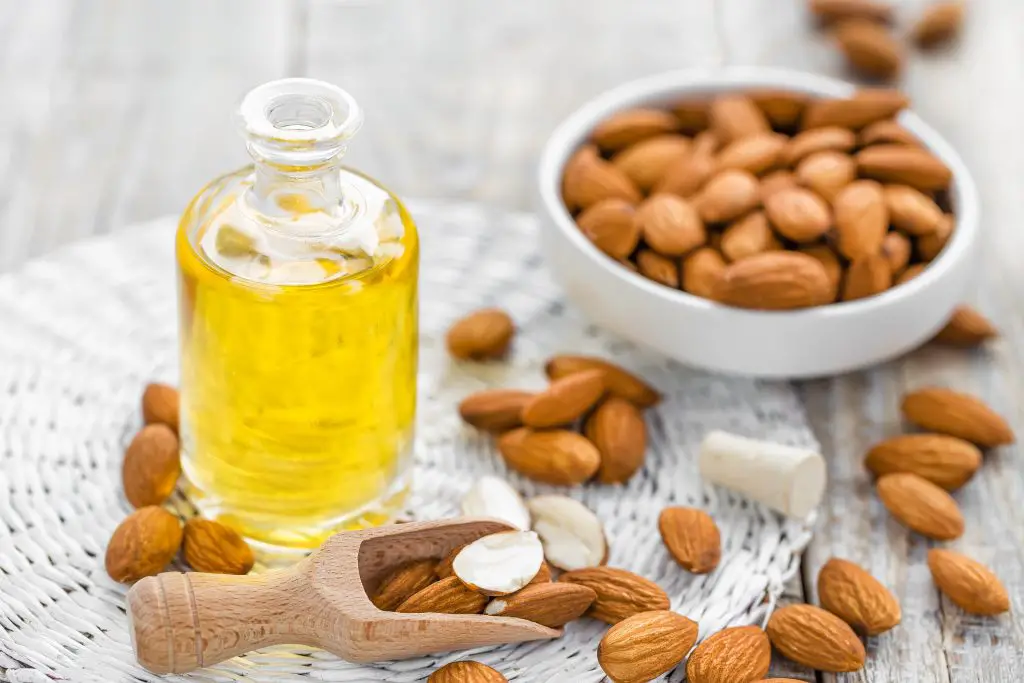
Final Thoughts
As you can see, almond oil can be a great addition to your hair regimen to encourage your hair growth. There is so much that it can do for your hair. It can make coarse hair smoother, keeps your cuticles healthy, strengthens your hair, and makes it shiny and vibrant.
More than that, almond oil can solve so many problems ranging from scalp ringworm to dandruff. Oils of any kind are like food for your body, giving you both nourishment and moisture. The pleasant smell of almond oil is simply a bonus.
Though you can use a few drops of almond oil before styling your hair, you must be careful about doing so. Heat styling with any oil in your hair can heat the oil enough to burn your hair, scalp, and follicles. Just a few drops of your almond oil can go a long way.
This can be helped if you wet your hair first since oils of any type are absorbed more readily into wet hair. Almond oil, applied to the tops of your hair, can help with split ends and can be used daily. Almond oil is also available in capsule form as an oral supplement.
Though that may not directly help your hair, the vitamins in almond oil are just as good as any supplement. You can buy the almond oil capsules or make your own if you have what you need to do so. Just be sure that you only use pure almond oil since some may contain other ingredients in them.
Almond shell extract is another option. It can be less oily and has many of the same advantages as almond oil. However, the extract may not be as moisturizing for your hair.


